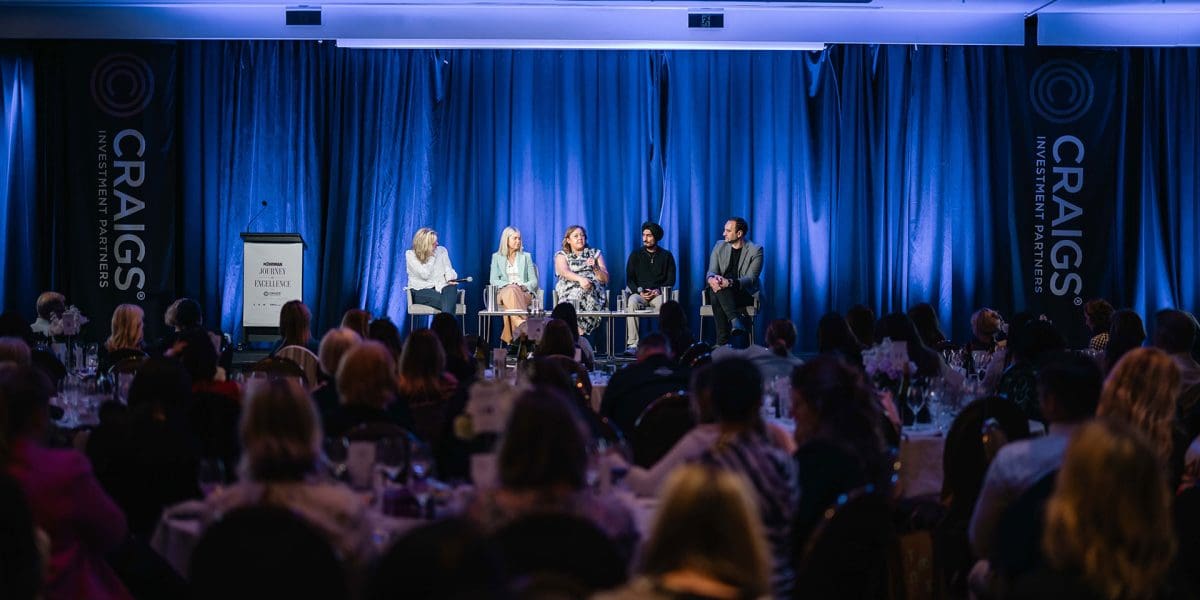Journey To Excellence – Executive Summary
The M2woman Journey to Excellence with Craigs Investment Partners brought to you by SRW, Tax Management New Zealand, and Waitiri Creek Wines held on October 27, 2023 was another powerful addition to the M2woman Journey to Excellence legacy. Even if we say so ourselves. This, the 14th Journey to Excellence event, celebrated the resilience and potential of individuals and organisations striving for excellence and their ability to effect positive change in the world. Since its inception in 2018, springboarded from the very topics and issues covered in this magazine, the M2woman Journey to Excellence has been a pivotal platform for advancing discussions and action on diversity, inclusion, sustainability, governance and leadership.
Reflecting on the evolving business landscape shaped by the integration of Environmental, Social, and Governance metrics, the emergence of Artificial Intelligence, and the dynamic shifts brought by new generations in the workforce, this latest event offered up deep insights and perspectives into the future of business and workplace culture, new solutions for sustainable industry, removing the pressures from our healthcare system and personal fulfillment connected to work and purpose.
And while nothing compares to actually being in the room for this discussion (hint, hint, the next event is Friday 31 May 2024 at Cordis Hotel Auckland by the way) we’ve gone ahead and boiled down the keynotes into bite-sized executive summaries for you in case you missed them or as a recap if you got to seem them live.
“New Ways of Creating Sustainable Industries”
Jacinta FitzGerald, CEO, Mindful Fashion
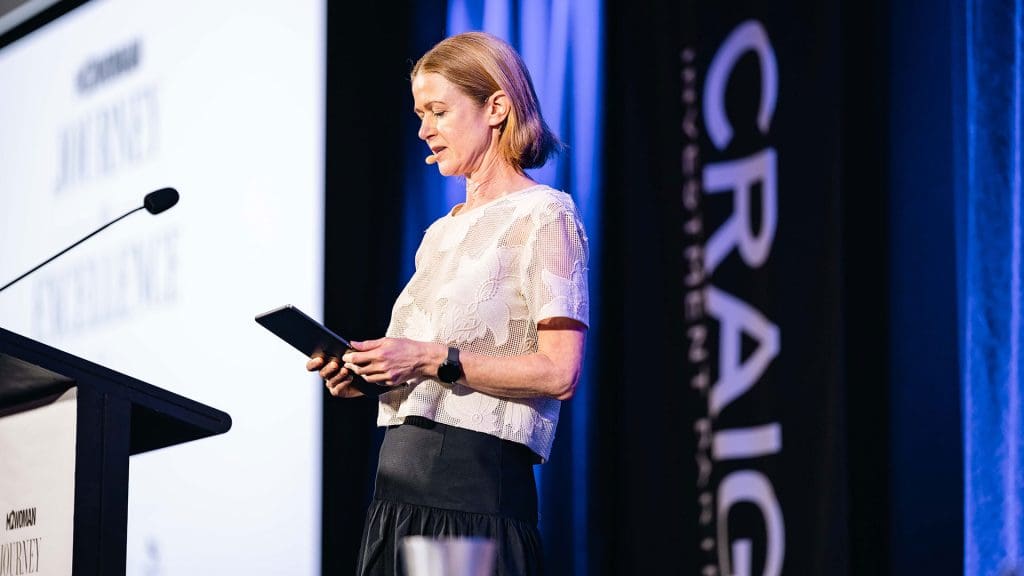
The fashion industry is at a turning point. It has long been criticized for its negative impact on the environment, but now there is hope for a more sustainable and regenerative future. Jacinta FitzGerald, a leader in the fashion sustainability movement, spoke about the need for change and the steps that individuals, organisations, and governments must take to make it happen.
FitzGerald emphasised that everyone has a role to play in creating a sustainable fashion industry. She stressed that this future is no longer just a distant utopian vision, but something that needs to be built now. It requires investing in traceable supply chains, renewable energy, and people. She also highlighted the importance of time, as real change cannot happen overnight.
As the CEO of an organisation dedicated to promoting sustainability in the fashion industry, FitzGerald has witnessed firsthand the impact that can be made by addressing key areas of concern. However, she believes that the current status quo is not enough. There needs to be better communication and understanding of the value of sustainable practices.
Throughout her career, FitzGerald has learned the value of listening and being open-minded. She believes that no one has all the answers, and it is through collaboration and shared perspectives that solutions can be found. This is particularly important in an industry as complex as fashion, where multiple stakeholders have a role to play.
FitzGerald recognized the challenges that businesses face in implementing sustainable practices, particularly for small and medium-sized enterprises with limited resources. She highlighted the importance of support and education in helping these businesses make the necessary changes. Her organisation has been instrumental in providing guidance and resources to SMEs in the fashion industry.
One of the key messages from FitzGerald’s speech was the need to integrate sustainability into the core of a business strategy. For leading businesses, sustainability is not an afterthought but a fundamental aspect of their operations. By making sustainability a priority, these businesses are able to drive change within their industry and set a clear direction for others to follow.
FitzGerald acknowledged that making sustainable choices is not always easy. It requires making hard decisions that may disrupt existing practices. However, she urged individuals and businesses to consider the wider impact of their actions. Even small actions can contribute to a groundswell of change that can transform an entire industry.
“Leveraging AI and Technology to Alleviate the Pressure on Our Healthcare Industry”
Bindi Norwell, Group CEO, ProCare
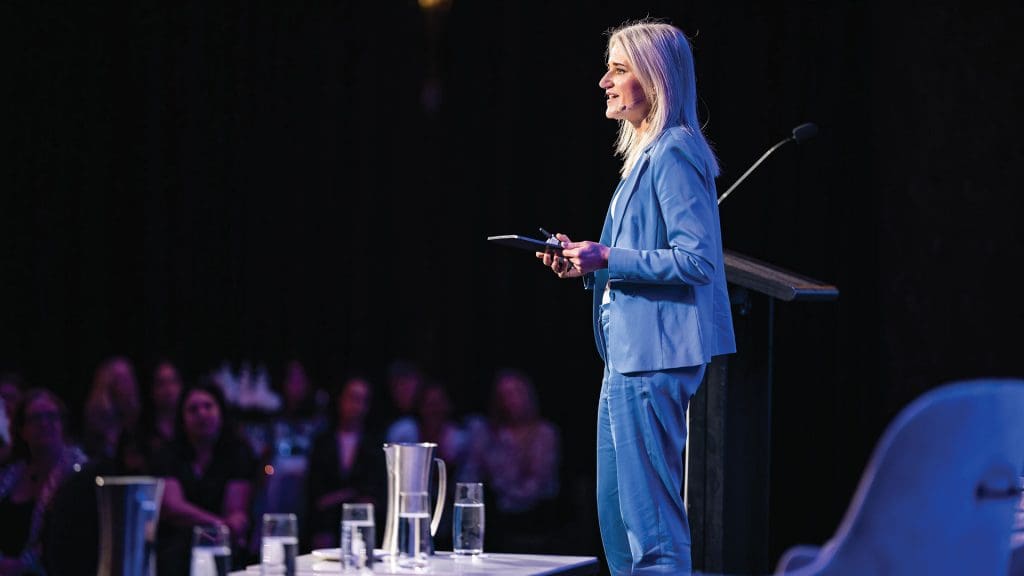
Artificial Intelligence has become an integral part of our lives, transforming various industries and revolutionising the way we work. In recent years, the healthcare industry has also started leveraging AI to improve patient care, increase efficiency, and enhance overall healthcare outcomes. Bindi Norwell, the Group Chief Executive Officer at ProCare spoke about the importance of embracing innovative technologies to propel the healthcare industry forward.
Norwell gave the inspiring example about AI is being used in Africa to overcome infrastructural challenges. Drones are being employed to transport medicine and blood in regions with poor road conditions, ultimately saving lives. This example showcases the transformative potential of AI in healthcare, even in resource-constrained environments.
Norwell also touched upon the role of data analytics and AI in improving healthcare outcomes. By harnessing the power of these technologies, healthcare providers can analyse vast amounts of data at an unprecedented speed, leading to faster and more accurate diagnoses.
Throughout her speech, Norwell shared personal experiences and highlighted the challenges she faced in a rapidly evolving healthcare landscape. She stressed the importance of having a mindset and culture of innovation, where organisations embrace new ideas and opportunities. Norwell emphasized that organizations should be willing to disrupt old ways of working that no longer serve their purpose.
Norwell emphasised the need to collaborate with partners, funders, and stakeholders to bring innovations to market more quickly. She recognised that having a strong vision for a team or organisation is crucial, aligning everyone towards a common purpose. “People want to work for purpose-led organisations, they want to have some reason and a purpose now, so it’s really important that we bring that to the fore.”
Norwell emphasized that leadership is not about self-importance but about empowering others. Throughout her speech, Norwell discussed the significance of a growth mindset and fostering a culture of innovation within the healthcare sector. Norwell also highlighted the need for organisations to continuously innovate to stay ahead and emphasised that a failure to do so can lead to falling behind not only within their organisations but also in the country as a whole.
“Transitions for Meaningful and Sustainable Living and Working”
Professor Marjo Lips-Wiersma, AUT
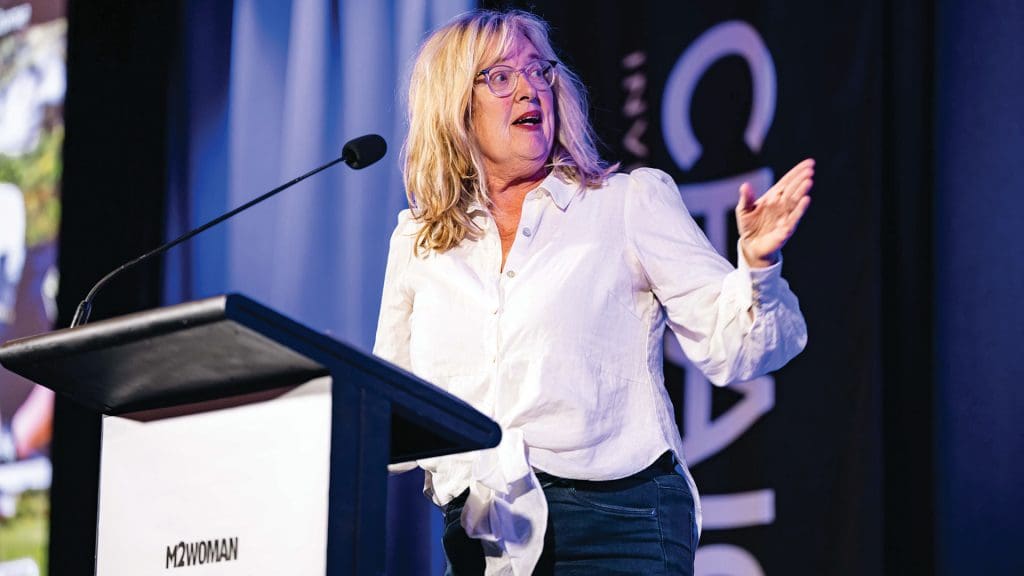
Professor Marjo Lips-Wiersma, the Professor of Sustainability and Ethics Leadership at Auckland University of Technology, emphasised the importance of living sustainably and how it can bring more meaning to our lives. Throughout her talk, Professor Lips-Wiersma touched upon various aspects of sustainability and its impact on individuals, communities, and businesses.
One of the key messages that Professor Lips-Wiersma conveyed was the detrimental effects of greenwashing. She highlighted how greenwashing undermines our trust in ourselves, in each other, and in our society. She stressed that in order to lead meaningful lives, it is essential to ground ourselves in reality and make conscious decisions about our consumption patterns. She pointed out that individual consumption makes a significant difference in whether we can achieve climate change goals.
Professor Lips-Wiersma argued that the crisis is not just about restoring the planet but also about creating meaningful connections, conversations, and support. She emphasised the need for justice in sustainability initiatives, stating that unity cannot be achieved without it.
In addition, Professor Lips-Wiersma highlighted the significance of community engagement in creating meaningful change. She expressed concern that too much focus on work distracts us from the bigger difference we can make in our communities. She shared examples of community-led initiatives that include training and participation for everyone involved.
The speech also touched upon the role of sustainability in the workplace. Professor Lips-Wiersma discussed how companies that engage in greenwashing can negatively impact employee satisfaction, trust, and commitment. She highlighted the importance of aligning organisational values with sustainability initiatives to create a sense of meaning for employees.
Throughout her speech, Professor Lips-Wiersma reiterated the interconnectedness of sustainability, meaning, and personal well-being. She highlighted how living sustainably can help overcome patterns of self-protection and fractured communities. She urged individuals to find alignment with their values and express their unique talents to live more meaningful lives.
Professor Lips-Wiersma also acknowledged the importance of hope in sustainability efforts. She emphasized that hope should not be seen as a passive or false belief, but rather as an active force that drives collective action.
The Future Of Work
Susan Peterson, Independent Director
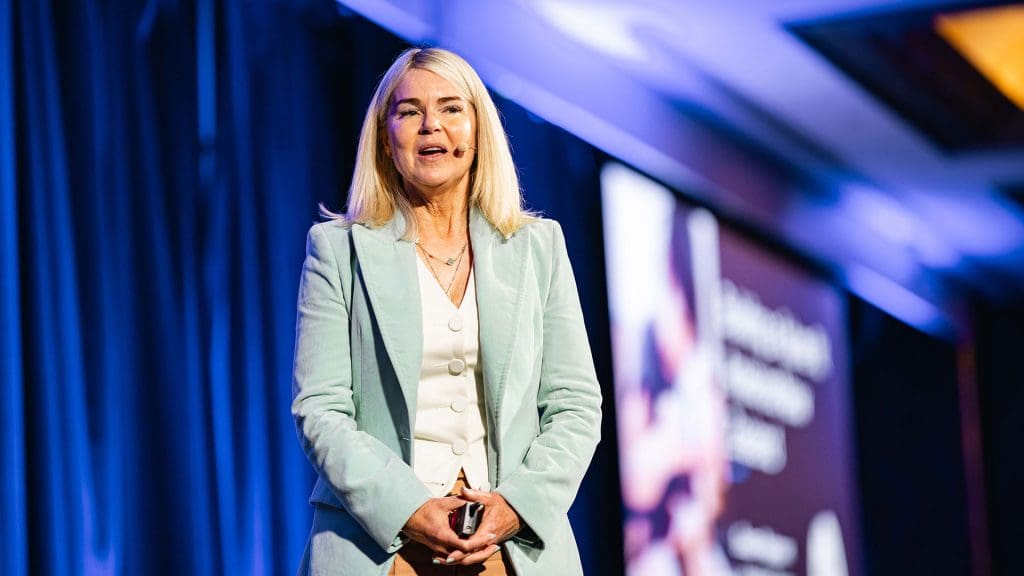
Susan Peterson, a prominent figure in New Zealand’s business landscape, shared her personal journey, from her early years to her current position on the board of some of New Zealand’s most iconic companies along with her insights into the future of work and the generational differences that are shaping it.
Peterson acknowledged the changing dynamics within the workforce, such as an aging population and declining fertility rates, and highlighted the need for adaptability and forward-thinking strategies. Referencing her involvement with Craig’s Investment Partners and Xero, Susan highlighted the importance of democratising access to small business insight tools and planning for the future of work.
Peterson also touched upon the role of social connections and purpose in the workplace. She stressed that work should not be the sole focus of one’s life, but rather part of a broader tapestry of meaningful relationships. “People come to work and expect to have a social interaction which is meaningful and play meaningful relationships in their lives,”
As she discussed the generational differences shaping the future of work, Peterson highlighted the importance of understanding each generation’s unique values and aspirations. She pointed out that Gen Z, the youngest generation in the workforce, values purpose and meaningful work above all else. “72% say having purpose and meaning in my work matters most,” she noted.
Peterson urged businesses to embrace diversity, foster social connections, and align with the values of the younger generations. She highlighted the importance of planning for the future and understanding the demographic shifts that will shape the workforce. She encouraged businesses to invest in understanding the needs and aspirations of different generations and aligning their values with those of their employees. From the importance of authenticity and adaptability to the need for diversity and sustainability, Susan pinpointed key factors that will shape the workforce of tomorrow.
